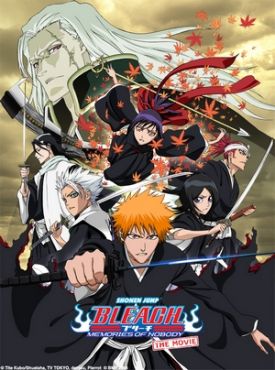 Tite Kubo’s Bleach, an action-packed supernatural adventure, has been a phenomenally successful manga series (approaching 40 volumes in English) and anime TV series (275 episodes). (The irony here is that when Kubo first offered it to a publisher, it was rejected.) Three feature films have been developed from the series. Memories of Nobody is the first.
Tite Kubo’s Bleach, an action-packed supernatural adventure, has been a phenomenally successful manga series (approaching 40 volumes in English) and anime TV series (275 episodes). (The irony here is that when Kubo first offered it to a publisher, it was rejected.) Three feature films have been developed from the series. Memories of Nobody is the first.
The basic situation for the series is that fifteen-year-old Ichigo Kurosaki (his first name means “strawberry,” for his red hair) has always been able to see ghosts. This has now made him a target for a kind of wandering spirit known as a “Hollow” — souls that cannot enter the Soul Society and so wander the earth, feeding off the souls of the newly dead — and the living. He encounters Rukia Kuchiki, a Soul Reaper whose job is to destroy Hollows and to send other souls on their way to the Soul Society. When a Hollow attacks Ichigo’s home, Rukia is forced to try to give him some of her power to help fight it off; unfortunately, she winds up giving him all of her power, making him a Substitute Soul Reaper. After they defeat the Hollow, Rukia has to lay low until her power regenerates. But Ichigo is still a Soul Reaper — and a very powerful one.
Memories of Nobody begins with a strange build-up of spiritual energy. Suddenly, Ichigo and Rukia are beset by “Blanks,” souls with no memories. They are hard pressed until the advent of Senna, a Soul Reaper who manages to make short work of the Blanks. The only problem is, the Soul Society has never heard of Senna. And there’s a crisis on the rise: the World of the Living and the Soul Society are being drawn together by a strange current generated in the Valley of Screams, which appears when Blanks reach, as it were, a critical mass. There’s a plot involved, by a clan that was banished from the Soul Society a thousand years before, and Senna is a central part of it.
Where to start? The story is tight and engaging, with lots of action. The final battle between the Soul Reapers and the Dark Clan is great fun. I especially liked the way the Soul Reapers and their opponents aren’t particularly bound by the laws of gravity — there’s something about a mid-air sword fight that’s really appealing.
The animation is excellent. It’s obvious the crew were able to take the time and care to create a fluent and seamless visual experience. Character designs are also wonderful — the characterizations are strongly individual and fully realized, and faces and body language are very expressive. Settings and backgrounds are complete without being obtrusive, and beautifully rendered. From the standpoint of creative design, this one is top notch.
Which leads me to the character of Ichigo, on whom the whole story hinges. He’s a remarkable young man, a saint with attitude, confrontational, idealistic, and with a streak of compassion a mile wide. Senna, likewise, is a very appealing character, a scatterbrained teenage girl whose memories are not all her own. In fact, the characters as a group are well-rounded personalities, including those Soul Reapers and Ichigo’s school friends who make brief appearances. Even the villain, Ganryu, shows signs of humanity. They’re all more than cartoons.
And I’ve got to mention Kon. Kon is a modified soul who takes over Ichigo’s body when he is in Soul Reaper mode. (Remember, Soul Reapers are spiritual warriors and don’t necessarily have physical bodies.) In between times, he occupies a stuffed bear. He’s also one of the main sources of comedy — he and Ichigo don’t get along all that well, and their confrontations are pretty funny.
My one gripe is that this is a two-disc set, and the second disc is completely taken up with “special features,” which are mostly storyboards and various trailers. The featurette on the making of the film, though, will be very helpful to those who are not familiar with the series. It contains commentaries by many of those involved in the production, including some of the actors from the English dub, explaining the background. (As always, I watched with Japanese dialogue and English subtitles. I just prefer it that way.) There is also a very helpful booklet that outlines the story and introduces the characters. I just wish they had put the featurette on the same disc as the movie and offered it at half the price.
This is an original story based on the characters and situations in the series. I have the advantage of having at least started the manga series, and I’ve watched the first few episodes of the TV anime, so I wasn’t completely lost. I don’t think I’d necessarily recommend coming into it cold, unless you’re prepared to take a lot on faith. But you can always watch the featurette and read the booklet to get up to speed. I loved it — I’ll probably revisit it periodically. It’s a four-plus.
(For full credits, see the listing at IMDb.)
(Viz Media, 2006)
